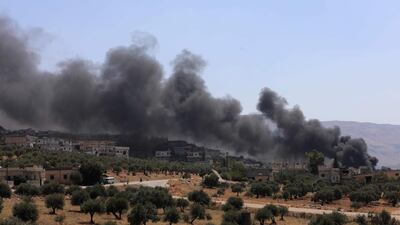For the past week, military blogs have been filled with details of Russia's astonishing military build-up in the Eastern Mediterranean. At least a dozen warships have gathered off the coast of Syria, backed by submarines, with the Russian defence ministry suggesting another dozen ships might be on the way. The last time Russia gathered such a force was three years ago in 2015, before the brutal assault on Aleppo.
What Moscow still disingenuously calls a military exercise is clearly part of the preparations for the final regime assault on the last rebel province of Idlib.
For at least a week, Russia has been preparing the political groundwork. Last Wednesday Saudi Arabia’s foreign minister Adel Al Jubeir was in Moscow for talks on Syria. A day later, Syria’s foreign minister Walid Al Muallem flew in. In apparently co-ordinated statements, Mr Al Muallem said the regime would fight terrorists inside Idlib “whatever the sacrifices” while Russia’s foreign minister Sergei Lavrov, standing next to him, said the main task was to “wipe out those terrorist groups” inside the province.
Then on Monday, Iran’s foreign minister Mohammad Javad Zarif, speaking in Damascus, said: “The remaining terrorists in the remaining parts of Idlib must be cleaned out” for the region to be returned to the regime.
Only one seat of government has been silent: Ankara. That is because Turkey has been forced into a position where it has no good choices and no strong allies. Even as the people of Idlib are surrounded, it is Turkey that is desperately looking for a way out.
Turkey's essential problem is that Idlib has become central to its plan to retain influence in Syria once the majority of its territory returns to the regime. The Ankara-backed rebel groups have their main bases in Idlib but they are interwoven with at least 10,000 fighters from Hayat Tahrir Al Sham (HTS), the Al Qaeda-linked group most consider terrorists.
Turkey is therefore in a bind: if it seeks to defend its interests and the rebel groups by stopping an assault on Idlib, it will also inadvertently help HTS and will have to face Russia on the battlefield. If it bows to its alliance partners and accepts the assault on Idlib, it could face a million new refugees and there will inevitably be rebel blowback on its own territory.
Worse still, Ankara has to make this choice alone because western powers are yet to show signs of intervening. US President Donald Trump tweeted a warning not to recklessly attack Idlib with the words: "The Russians and Iranians would be making a grave humanitarian mistake to take part in this potential human tragedy. Hundreds of thousands of people could be killed. Don't let that happen." But as Russian jets struck Idlib tonight, the US administration had still not responded at the time of writing.
And in an astonishing admission, which could be read as a warning to civilians in Idlib not to expect outside help, France's foreign minister said on Monday that Bashar Al Assad had "won the war" but not the peace. Comments from US Defence Secretary James Mattis suggest Washington is more focused on stopping chemical weapons being used than stopping any assault.
The UN’s special envoy Staffan de Mistura has offered to broker a deal but it is not clear where any evacuated civilians would go. Many are reluctant to go into regime-held territory for fear of being imprisoned – or worse – while Turkey has said it will close the border to any refugees.
All this political signalling contributes to a sense that an endgame is approaching. And this weekend is the deadline.
Friday will see a major summit on Syria in Tehran, attended by Russia's Vladimir Putin, Turkey's Recep Tayyip Erdogan and Iran's Hassan Rouhani. The frantic diplomacy to and from Damascus suggests that the outline of a plan already exists. Russia’s “naval exercise” is due to end on Saturday, which suggests a possible timeline for the attack.
That gives Mr Erdogan just days to find a way out.
But with the major parties framing the coming assault as an anti-terror operation and the US so far taking a back seat, there is almost nothing that will stop a major attack. The best Turkey can hope for is to stall the attack and seek other ways to break up HTS. But its attempts to get HTS to disband have proven fruitless.
Rebel groups are already fighting among themselves and are in no position to take on HTS, which is the largest militant group in Idlib.
Ankara's best option now might be to join the assault on Idlib in some form, targeting mainly HTS and hoping to protect its rebel allies from Russian bombs. That would certainly spark a war with extremist groups, targeting civilians inside Turkey, but Ankara might judge that to be a better outcome than another million refugees.
And it is the civilians in all of this who are the real victims. The real tragedy is how invisible the three million civilians in Idlib are. None of those meeting in Tehran this week have their interests in mind. What happens in Idlib has become almost entirely a question of politics, of balancing the interests of great powers.
What will happen to those civilians – if they flee north into Turkish cities, south into the regime’s clutches or are stranded in between, starved on the ground and rained on by bombs – barely warrants a mention.
Turkey might be searching for a way out but it is the Syrian people who are truly trapped.


